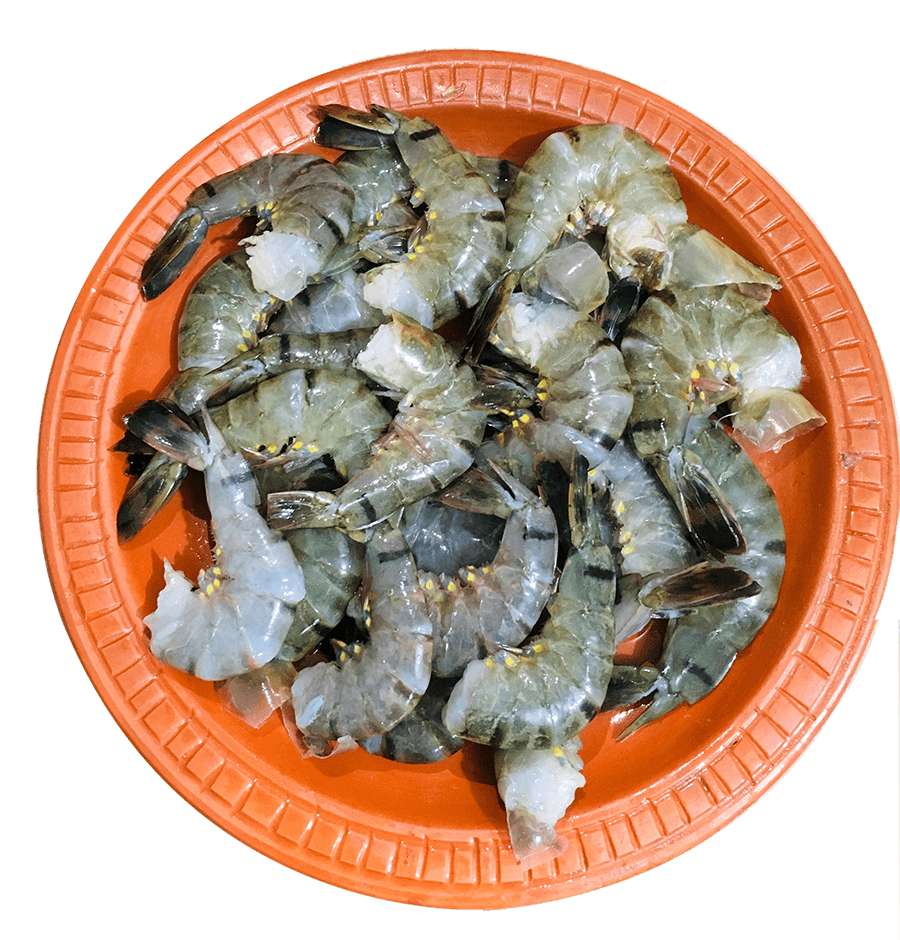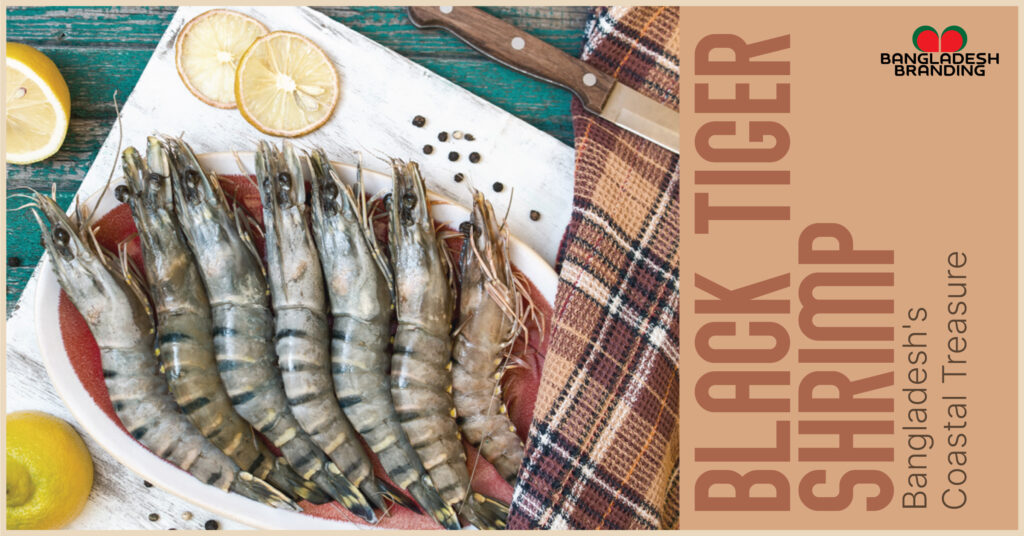Black Tiger Shrimp: The Jewel of Bangladesh’s Aquatic Harvest
The Black Tiger Shrimp was recognized as “Bagda Chingri” and reached this fantastic milestone of being recognized as the tenth Geographical Indication product of Bangladesh. This coveted certification under the Department of Patents, Designs, and Trademarks under the Ministry of Industries showcases the rich heritage and quality associated with Bagda shrimp.
The Department’s Registrar, Zanendra Nath Sarker, confirmed the announcement, adding that discussions for giving the Fazli Mango a similar GI certification have at least reached the hearing stage.
Unique Aquatic Treasure: Expansion
Black-striped Bagda shrimp cultivation in the Sundarbans of Bangladesh first started nearly a century ago. After the 1970s, when the international demand for the species suddenly developed, the farming of Bagda shrimp spread all over Bangladesh. During the 1980s, it became an exportable item on the list in Bangladesh and received remarkable importance in the national economy.
Bagda shrimp is renowned worldwide because of their quality, exclusive flavor, and unique coloration, so they are considered different from other varieties. These attributes have contributed to giving them a premium market price, which is likely to appreciate even more as global recognition grows.
The Journey to Geographical Indication Certification
For better export and strengthening its presence in the global market, Bagda shrimp came under the GI recognition application by the Department of Fisheries, Bangladesh, in May 2019. These would help in promoting them as specialized products of Bangladesh in the international arena. The registration included much deliberation, and a gazette notification was issued on October 6, 2023, by the Department of Patents, Design, and Trademarks, along with its publication in two international journals.
According to the rules, after publication in the journals, there is a two-month period where objections may be filed. In case no one files an objection within the stipulated period, the GI certification process proceeds uninterrupted. In the case of Bagda shrimp, the deadline expired on December 6, 2023, thus clearing the path for its recognition as a GI product.

Global Recognition and Future Prospects
GI certification for Bagda shrimp is one gigantic step toward giving it an international stature. It gets protection against imitation as any GI-certified product and is expected to fetch a higher price in the international market. This identity not only recognizes the unique attributes of Bagda shrimp but also reflects its cultural and economic importance with regard to Bangladesh. With the global demand for quality seafood on the rise, the recognition as a GI product once again puts Bangladesh ahead in exporting such a delectable aquatic delicacy. The future of Bagda shrimp thus looks bright with the possibility of its attaining better market demand and appreciation for its qualities worldwide.
The Geographical Indication status accorded to Bagda shrimp is a recognition of Bangladesh’s initiatives in preserving and promoting unique agricultural and aquaculture products. Local farmers and exporters are being exposed to new possibilities of ensuring heritage and quality for Bagda shrimp at the global level with the GI certification. Bagda shrimp joins the elite group of local specialties of Bangladesh, ranked as the tenth such product of the country, further improving its portfolio of unique offerings.
Food Value and Health Benefits of Bagda Shrimp


Bagda shrimp, also known as Black Tiger Shrimp, is not only a delicious and popular seafood choice but also offers numerous health benefits due to its rich nutritional profile. Here’s a closer look at the food value and health advantages of consuming Bagda shrimp:
Food Value of Bagda Shrimp
Bagda shrimp is packed with essential nutrients that are important for overall health. The nutritional components of Bagda shrimp per 100 grams typically include:
Calories: Approximately 99 kcal
Protein: 20-24 grams
Fat: 1.5 grams (mostly healthy fats)
Carbohydrates: 0 grams
Cholesterol: Around 150-190 mg
Vitamins: Rich in Vitamin D, B12, and B6
Minerals: Good source of iodine, selenium, zinc, iron, magnesium, and phosphorus
Omega-3 Fatty Acids: Contains beneficial amounts of EPA and DHA
Health Benefits of Bagda Shrimp
High-Quality Protein Source: Bagda shrimp is an excellent source of high-quality protein, providing all essential amino acids required by the body. This makes it ideal for muscle growth, repair, and maintenance, especially for athletes and individuals looking to increase their protein intake.
Rich in Omega-3 Fatty Acids: The shrimp contains omega-3 fatty acids, particularly EPA and DHA, which are known to reduce inflammation, support heart health, and lower the risk of chronic diseases such as heart disease and arthritis. Omega-3s also promote brain health and cognitive function.
Supports Heart Health: Despite its cholesterol content, shrimp has been found to have a neutral or positive effect on heart health. The omega-3 fatty acids, along with the antioxidant astaxanthin present in shrimp, help to lower LDL (bad) cholesterol levels while increasing HDL (good) cholesterol levels. They also help to reduce blood pressure and prevent blood clots, thus reducing the risk of stroke and heart attacks.
Good for Bone Health: Bagda shrimp is a good source of minerals like calcium, phosphorus, and magnesium, all of which are vital for maintaining strong and healthy bones. Regular consumption can help prevent osteoporosis and other bone-related issues, particularly in older adults.
Boosts Immunity: The selenium found in Bagda shrimp is an essential trace mineral that acts as an antioxidant, protecting cells from damage and boosting the immune system. Selenium is also important for thyroid function and may reduce the risk of certain cancers.
Promotes Weight Management: Shrimp is low in calories and carbohydrates while being rich in protein, which can help promote satiety and reduce overall calorie intake. Including Bagda shrimp in a balanced diet can support weight management and help in maintaining a healthy weight.
Enhances Skin Health: Shrimp contains astaxanthin, a powerful antioxidant that helps protect the skin from damage caused by UV rays and environmental pollutants. It also aids in reducing wrinkles and age spots, promoting healthier, more youthful-looking skin.
Supports Thyroid Function: Being rich in iodine, Bagda shrimp supports thyroid function, which is essential for regulating metabolism and energy levels in the body. Adequate iodine intake is crucial to prevent thyroid disorders like hypothyroidism.
Provides Essential Vitamins and Minerals: Shrimp is a good source of essential vitamins, such as B12, which supports nerve function and the production of DNA and red blood cells, and vitamin D, which is important for bone health and immune function. Other minerals like zinc and iron also play vital roles in maintaining good health.
May Improve Mood and Brain Function: The combination of omega-3 fatty acids, vitamin B12, and selenium in shrimp can help improve mood and cognitive function. These nutrients are known to support brain health and may reduce the risk of neurodegenerative conditions like Alzheimer’s disease.
Availability of Bagda Shrimp in Bangladesh
Bagda shrimp, or Black Tiger Shrimp, is widely available in Bangladesh due to its significant role in the country’s aquaculture industry. Here is an overview of its availability:
Primary Production Areas:
Sundarbans Region: The cultivation of Bagda shrimp is concentrated in the southwestern coastal region of Bangladesh, particularly around the Sundarbans, the world’s largest mangrove forest. Districts like Khulna, Satkhira, Bagerhat, and Cox’s Bazar are major hubs for shrimp farming.
Coastal Districts: Beyond the Sundarbans, Bagda shrimp farming is also prominent in other coastal districts, such as Chittagong, Patuakhali, Noakhali, and Barisal. These areas provide the ideal brackish water conditions needed for Bagda shrimp cultivation.
Seasonal Availability:
Year-Round Supply: Bagda shrimp is cultivated throughout the year, but the peak seasons for harvest are generally from April to October. During these months, the shrimp is abundantly available in local markets and for export.
Local Markets and Distribution:
Local Fish Markets: Bagda shrimp is commonly sold in local fish markets across Bangladesh. Major fish markets in Dhaka, like Karwan Bazar, and in Chittagong, such as Fishery Ghat, frequently stock fresh and frozen Bagda shrimp.
Supermarkets and Grocery Stores: Many supermarkets and grocery stores in urban areas, including Dhaka, Chittagong, and Khulna, offer Bagda shrimp in both fresh and frozen forms. Popular stores like Agora, Shwapno, and Meena Bazar typically carry it.
Online Platforms: With the rise of online grocery shopping in Bangladesh, Bagda shrimp is also available through e-commerce platforms such as Chaldal and Daraz, allowing consumers to order it conveniently from home.
Export Markets: Global Exports: Bagda shrimp is one of Bangladesh’s most significant export commodities. It is shipped to numerous countries, including the United States, the European Union, Japan, and other Asian nations. The shrimp is exported in various forms, such as fresh, frozen, and processed, depending on the market demand.
Aquaculture Practices:
Traditional and Semi-Intensive Farming: Bagda shrimp is primarily farmed using traditional and semi-intensive aquaculture methods. Small-scale farmers often rely on natural tidal water and minimal inputs, while larger farms may use more controlled methods to ensure higher yields.
Sustainable Practices: There is a growing emphasis on sustainable shrimp farming practices in Bangladesh, focusing on environmentally friendly methods to reduce the impact on local ecosystems. This includes improved water management, better feed practices, and disease control measures.
Government Support and Initiatives:
The Government of Bangladesh actively supports the shrimp industry through various initiatives, including training for farmers, providing access to quality seeds, and promoting sustainable farming practices. Additionally, efforts are made to improve infrastructure, such as cold storage facilities and transportation networks, to enhance the availability and export potential of Bagda shrimp.
Challenges in Availability:
Environmental Factors: The availability of Bagda shrimp can be affected by environmental factors, such as water salinity, temperature changes, and pollution. Natural disasters, like cyclones and floods, also pose risks to shrimp farms, impacting their production and supply.
Disease Management: Shrimp diseases, such as the White Spot Syndrome Virus (WSSV), can impact Bagda shrimp farming. Farmers must implement effective management practices to prevent outbreaks and ensure a stable supply.

